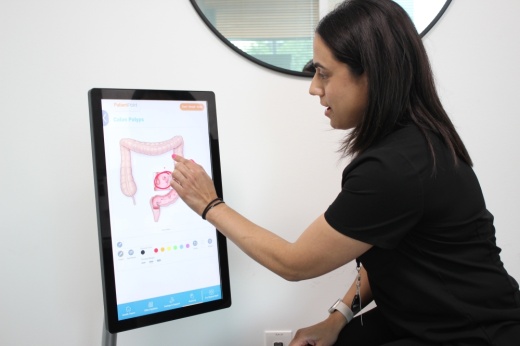In 2024, over 12,200 Texans are predicted to be newly diagnosed with colorectal cancer, according to the American Cancer Society. It is second only to California, which is estimated to have over 16,000 new cases.
While the benchmark age was previously 50 for insurance-covered colorectal screenings, that age has since dropped to 45. As the rate of colorectal cancer diagnoses in younger people rises, specialists are turning to prevention as their first line of defense.
“While we call it colon cancer screening, it really is colon cancer prevention,” Dr. Sanjana Luther with Austin Gastroenterology said. “We’re really making sure that polyps, which are abnormal growths, are out of there before the cancer can even start.”
The big picture
Due to changes in lifestyle and a greater emphasis on screenings, the overall rate of people in the U.S. who are diagnosed with colon or rectal cancer has dropped each year since the 1980s, according to ACS.
Despite the overall decrease, colorectal cancer is now the leading cause of cancer deaths in men under 50, and the second-leading cause of cancer deaths in women under 50, according to a 2024 report by the ACS.
Dr. Andrew Miller, a surgeon for Texas Colon & Rectal Specialists’ Austin North and Round Rock locations, said this is a trend that is still being explored. However, it is something medical experts across the board are seeing.
“We are catching younger and younger people,” Miller said. “At this point in my practice, probably a third of my patients with colorectal cancer are under the age of 50. We’re not exactly sure why that is ... but it is a trend that is startling.”
Meanwhile, Texas has one of the lowest rates for colon screenings in the U.S., according to data from the National Cancer Institute—another trend local health experts are hoping to reverse.
On average, 223 incidents of colon or rectal cancer are reported annually for people of all ages in Travis County, with an average age of 61.9, according to NCI. Between 2016-2020, Travis County averaged 49 new colorectal cancer cases in people under 50 annually.
Diving in deeper
Colorectal cancer, called colon or rectal cancer depending on where it occurs within the large intestine, is one of the most common types of cancer but also one of the most preventable, Luther said.
One preventive option is called a colonoscopy, which is a sedated procedure where a thin, flexible scope is inserted through the anus to observe the lower intestinal tract. Taking on average 15-30 minutes, the procedure finds and removes polyps, or abnormal tissue growths, Luther said.
Though one-third of people are estimated to have polyps, there is only a 1 in 200-300 chance of those polyps being cancerous, said Dr. Ricardo Solis, a member of the Texas Colon & Rectal Specialists group within cancer treatment and research organization Texas Oncology.
Although not all polyps are cancerous, removal helps reduce the risk of colon cancer from developing, Luther said. The time it takes from a patient having a normal colon to developing polyps and then cancer takes about 10 years, Solis said.
“It really is a simple exam that has very minimal complication rates,” Solis said. “Usually, [patients are] in and out of any facility within two hours from the time they walk in to the time they walk out.”
Alongside colonoscopies, there are alternative methods of testing for colon cancer such as fecal tests. A colonoscopy is better than a fecal test, but a fecal test is better than nothing, Luther said, as fecal tests run the risk of showing false results and they do not include any preventative actions.
“All these other kinds of tests are either checking people for symptoms of cancer and polyps or for cancer, but remember, with a colonoscopy we actually want to prevent cancer,” Solis said.
According to a 2021 report by the U.S. Preventive Services Task Force, the estimated number of colorectal cancer cases averted per 1,000 individuals who begin screening at age 45 ranges from 42-61 cases.
Did you know?
According to the NCI, colorectal cancer warning signs include:
- A change in bowel habits
- Blood in or on your stool
- Diarrhea, constipation or feeling that the bowel does not empty all the way
- Abdominal pain, aches or cramps that don’t go away
- Unexplained weight loss
- Fatigue
- Vomiting
“Prevention is really what I would advocate for ... because that’s where it all starts. By the time you turn 45, you really want to do a colonoscopy versus any other modality there is,” Solis said.
Zooming in
Texas ranks 45th for the rate of people between 45-75 who have received a recommended colon screening, according to the most recent NCI data.
The Affordable Care Act requires private insurers and Medicare to cover the cost of colorectal screenings because the tests are recommended by the U.S. Preventive Services Task Force. However, the task force recommends people at average risk begin screening at 45, and patients are still likely to incur costs for services related to the procedure.
“I think we would all be really happy to hear that screening number moved to 40, but that’s a big foundational shift amongst a lot of bureaucracies, but hopefully over time the data will support that,” Miller said.
Access to health insurance is just one factor impacting Texas’ low rate, said Dr. Navkiran Shokar, chair of the Department of Population Health at Dell Medical School.
Shokar is leading an initiative called the Coordinating Center for Colorectal Cancer Screening across Texas, meant to create a statewide network of health organizations and develop a plan for expanding screening resources.
Shokar said it can be difficult for people to find a physician, arrange a timely screening, receive test results and book a follow-up colonoscopy.
“We want to help facilitate the clinical systems to support screenings, testing and treatment,” Shokar said. “We also have to work on education for patients, so they understand the need for screening and know where the resources are.”
A closer look
There are various types of colorectal cancer screening types, according to the NCI and ACS:
- Fecal immunochemical test (FIT): A test to check for hidden blood in stool
- Blood test: Requires a blood draw to detect the presence of cancer
- Sigmoidoscopy: Used less often to examine lower part of the colon
- Colonoscopy: Checks the entire colon and can remove polyps
- Virtual colonoscopy: Uses x-rays and a computer to create images of the colon
Although there is an equal chance of men and women getting colorectal cancer based on age, Solis said there are other factors that may influence who gets it, such as family history, obesity, dietary patterns and smoking.
Aside from getting routine colonoscopies, there are a number of lifestyle changes individuals can make to mitigate the chances of getting colon cancer, Solis said.
“When we tell you that you need to prevent colon cancer, it means try to eat properly... get your sleep, get your exercise. These are all important factors in trying to prevent colon cancer,” Solis said.
Per Texas Oncology and the Centers for Disease Control and Prevention, there are a variety of steps people can take to mitigate the risk of colorectal cancer, including:
- Getting screened
- Maintaining a health weight
- Stopping smoking
- Limiting alcohol
- Limiting red meat to two meals a week
- Eating more whole grains and fiber






